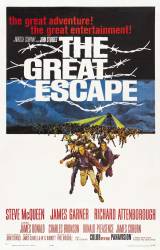Trivia: While Steve McQueen performed most of his own stunts, the only stunt he didn't perform was the 60 foot jump over the Austrian-Swiss border fence. The jump was performed by stuntman Bud Ekins, who later doubled for McQueen in "Bullitt."
Trivia: Paul Brickhill, who wrote the novel the film is based on, was a member of the X organization which planned the escape.
Trivia: The motorcycle used by Steve McQueen is the same motorcycle Henry Winkler used on "Happy Days."
Trivia: Steve McQueen, James Coburn, and Charles Bronson previously starred together in another John Sturges movie, "The Magnificent Seven."
Trivia: Jill Ireland was married to David McCallum at the time this film was made. She later married Charles Bronson.
Trivia: In the scene following Hilts' theft of a German motorcyle, he rolls into a German town, where he is stopped by a police officer; the officer says something to Hilts, who then kicks him away and rides off. He was asked for identification papers he didn't have.
Trivia: Donald Pleasance is the only actor to appear in both this film and the 1988 TV movie "The Great Escape II: The Untold Story"; here he plays one of the would be great escapees, and in the sequel, he played a member of the S.S.
Trivia: Donald Pleasence was an RAF pilot and a genuine POW. His plane was shot down, and he was interned in a German camp. In an interview about The Great Escape he said that the film's producers weren't interested in hearing his suggestions about making the camp scenes more realistic, so "I simply learned to shut my mouth."
Trivia: David McCallum, whose character is killed at the railway station while trying to escape, says that his daughter Sophie has never been able to watch this movie, "Because she cannot stand the thought of seeing her father shot."
Trivia: The actual camp site, which can still be visited, is in Zagan, Poland, which was, during the war, part of the Greater Reich.
Trivia: The actor Steve McQueen was no stranger to "cooler life"; he had a criminal record as a youth and while in the US Marines spent 41 days in the brig.






Suggested correction: It is true that most prisoners had their watches confiscated when they were captured. However, British POWs could write to Rolex in Geneva through the International Red Cross requesting a watch. Rolex would supply one with an invoice to be paid at the end of the war. The watches sent were steel because gold watches would have been confiscated by the guards. At least some of the prisoners involved in the Great Escape had these watches. Corporal Nutting, one of the masterminds, requested and received an Oyster 3525 Chronograph - a more upmarket model than the ones favoured by most POWs, which he used to measure the frequency of German patrols. After the war he paid £15 for it. In 2007 this watch and the associated correspondence was sold at auction for £66,000.
Peter Harrison
They are not wearing Rolex watches and the newly arrived prisoners are all wearing watches, which would normally have been confiscated.
No, they are not all wearing watches. Having watched the first half hour to check, the only definite watch I can see is being worn by Steve McQueen. I can't see enough of it to say definitively whether or not it matches the watches Rolex were sending. Many of the others are either definitely not wearing watches (Charles Bronson, for example) or, if they are, it is hidden by their clothes.
Peter Harrison